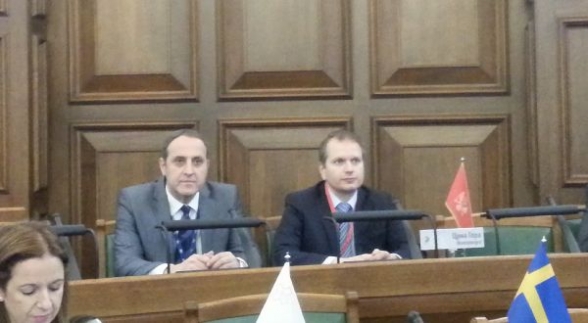At the beginning of the meeting, the attendees were addressed by Ms Ināra Mūrniece, Speaker of the Saeima of the Republic of Latvia, Ms Aija Barča, Chairperson of the Social and Employment Matters Committee of the Saeima of the Republic of Latvia and Mr Valdis Dombrovskis, Vice-President of the European Commission for the Euro and Social Dialogue.
In the first part of the meeting, within the first session titled: Promoting Inclusion of the Most Vulnerable Groups into the Labour Market, it was emphasised that Europe was currently facing a new set of challenges in the area of employment – aging societies, simultaneously with a dramatic change in the labour market, requiring specific technical skills, and the disappearance of traditional areas and types of employment. The most vulnerable groups: people with disabilities, people of pre-retirement age and long term unemployment find this situation particularly difficult to adapt to.
Within the second session, the participants spoke on social entrepreneurship as a tool for achieving social objectives. Social entrepreneurship as an approach for tackling social challenges is gaining popularity throughout Europe.Problems in the economy and the financial sector have driven civic society and public authorities to collaborate in seeking new ways to overcome challenges of unemployment, social exclusion and an ageing society, as well as to promote inclusive growth, creation of decent jobs and social involvement.
The third session was mostly discussed and it dealt with the Youth Guarantee Initiative. In the 2013 spring European Council meeting the EU member states agreed to develop the Youth Guarantee and basic principles of its implementation with the aim to address the youth unemployment problems within the EU. In March 2013, the Youth Guarantee was allocated EUR 6 billion. The Youth Guarantee envisages that within four months of becoming unemployed or graduating, all youths under the age of 25 receive a job offer, an internship, work placement or an opportunity to enrol in education that matches their skills. The allocations under the Youth Guarantee have been distributed to 20 EU member states: Belgium, Bulgaria, Croatia, Cyprus, the Czech Republic, France, Greece, Hungary, Ireland, Italy, Latvia, Lithuania, Poland, Portugal, Romania, Slovakia, Slovenia, Spain, Sweden and the United Kingdom.
MP Mr Andrija Popović addressed the attendees, saying that Montenegro as a EU candidate country, is a small country which, as a majority of other states faces a very low natality, i.e. the ageing population. In order to encourage natality and the birth rate, MP Popović said that the Union of Free Trade Unions with the support of political parties and the Liberal Party of which he is a representative, has launched an initiative which envisages that women who have at least three children and 25 years of service, or four children and 15 years of service may, if they wish, be eligible for early retirement. He said that, for now, there is no government support, but it remains to be seen whether this proposal will receive support in the Parliament of Montenegro
Head of Delegation Mr Srđan Perić also addressed the attendees, saying that Montenegro is facing the same problems as other countries. When it comes to youth, he said that there is a programme for trainees and that there are support programmes for a number of smaller businesses, for example: web, print and design industry, but that there is a number of problems, resulting from the small market. He stated the problem relating to the acquiring of new technologies. Generally, he said that Montenegro needs EU support in order to implement properly topics such as: Inclusion of the Most Vulnerable Groups into the Labour Market, Social Entrepreneurship and Youth implement.. Otherwise, as MP Perić concluded, too much will be expected from us, since EU business standards are high.








